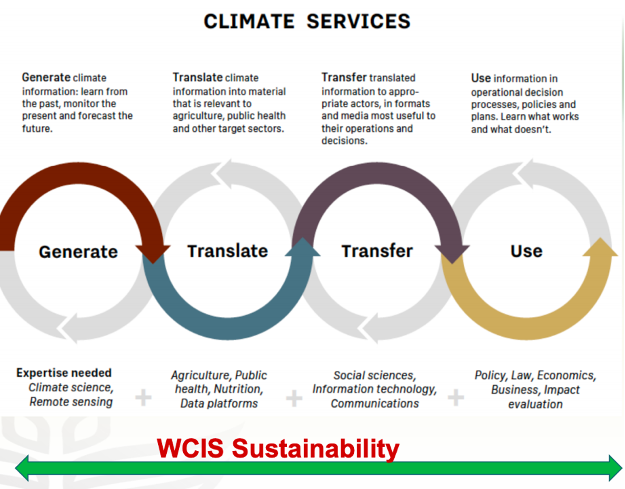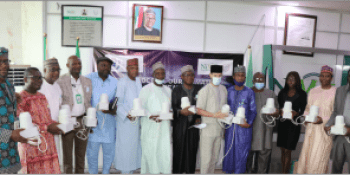Climate information services reach millions in the Sudano-Sahelian region

CCAFS and PARTNERS provide rigorous evidence on the potential benefits of climate information services IN West Africa.
Providing climate information services seems to be one of the most promising and sustainable strategies to do so. In August 2015, a case study conducted by CCAFS estimated that a total of 7.4 million rural people were potentially reached with climate information across the Senegal.
Another impact assessment indicates that more than 300,000 farmers using climate information services are now able to make mixed strategic decisions on crop variety selection, time of planting, time of applying fertilizer, time of irrigating, time of harvesting. This has resulted in a reduction in crop losses and a more increased household food availability for both men and women involved in the process.
Ensuring the availability of improved weather and climate information services in the context of adverse climatic conditions requires actions on many different fronts. Together with partners, the CGIAR Research Program on Climate Change, Agriculture and Food Security (CCAFS) in West Africa works to address these various aspects of climate information services.
A need for greater collaboration between users of climate service in the region
The Seasonal Forecasts of Agro-Hydro-Climatic Characteristics (PRESASS) is an example of an important yearly mechanism to generate seasonal predictions of agro-hydro-climatic characteristics during the rainy season for the Sudanian and Sahelian zones of West Africa and the Sahel. Co-led by the AGRHYMET Regional Center and the African Climate and Meteorological Application for Development (ACMAD), the seasonal forecasting forum PRESASS 2021 brought together experts from ACMAD, the Meteorological and Hydrological Services (MHS) of West African countries and Chad, the International Network of Basin Organizations (INBO), with the collaboration of WMO and representatives from some of the major World Climate Centres, representatives of ECOWAS, the Permanent Interstate Committee for drought control in the Sahel (CILSS), disaster risk reduction agencies and organizations of producers.
The forum concluded that the 2021 rainy season is expected to be overall wet with:
- rainfall amounts equivalent to above the seasonal averages for the 1981-2010 period over the Central and Eastern Sahel;
- an early to normal onset of the season;
- a late to normal ending of the season;
- longer dry spells at the beginning average towards the end of the season; and
- overall average to above average river flows.
Furthermore, it was concluded that only through greater collaboration between intended users that the utility of PRESASS outputs can be evidenced on the ground. It is in this perspective, that CCAFS West Africa was invited by AGRHYMET to share its experiences on the utility of weather and seasonal forecasts information for the management of climate variability in agricultural production during the sole rainy season in the Sahel region.
Recommendations for a sustained weather and climate information services provision
CCAFS' Dr. Robert Zougmoré spoke at the forum to provide insightful details on how to perpetuate the use of climate information services among the agricultural sector in the Sahel. He built on CCAFS' recent achievements and resources that aim to provide a coordinated, science-based response to climatic risks experienced by agricultural producers.
For example, he discussed the public-private partnership business model adopted by Esoko in Ghana, which has encouraged mass subscription to climate information services through mobile phones. In the same vein, an impact study in Senegal covering a climate information services project found that between 2011 and 2014, up to 3.9 million rural people were potentially reached with climate information. These successful results led to the funding of the CINSERE project by USAID, and to the mainstreaming of climate services as a major component to the World Bank-funded AICCRA project across Africa.
These efforts by CCAFS and partners are contributing to a promising path to improving food security and livelihoods in a climate risk context in the Sahel area. They also provide rich experiences to learn about how to promote the use of climate information services in the agricultural sector in the Sahel. As such, Dr. Robert Zougmoré shared the following lessons from CCAFS' work in Senegal, which can inform similar initiatives in the region:
- Building a robust database of producers to receive weather and climate information is key to understanding the producers, their habits and their needs.
- Improving the climate information services diffusion system via the community radios is less costly and highly effective compared to other systems.
- Engaging the private sector into the process is necessary to build business models that will sustain the climate service system.
- Encouraging subscriptions of producers to the insurance system will allow for the possibility of including the climate information services production and diffusion costs into the primes the producers pay. This helps to ensure long-term access to climate insurance for producers.

Climate Services Sutainability Model
Dr. Robert Zougmoré also elaborated on how the climate services transmission chain has been operationalized with the aim of sustainability into various initiatives, specifically in the Climate-Smart Village approach portfolios of actions and the challenge of the Public-Private Partnership business model as a means of sustaining weather and climate information services.
Sharing these lessons and insights from CCAFS' work with the participants aims to contribute to more effective and sustained usage of weather and climate information services in West Africa to combat the risks of climate change on food security.
The participation of CCAFS in this conference is part of the Accelerating the Impact of CGIAR Climate Research for Africa project, AICCRA funded by the World Bank and implemented by CCAFS.
For more details on the AICCRA project read the press release.



